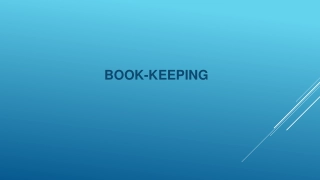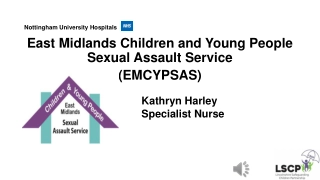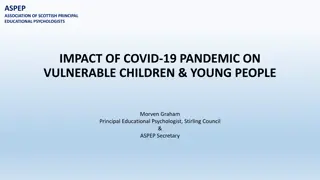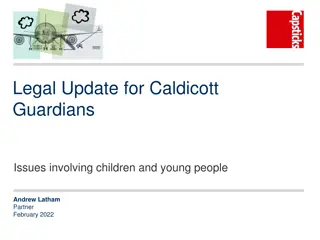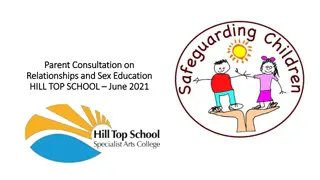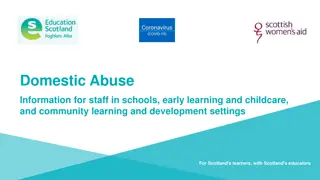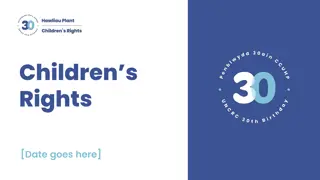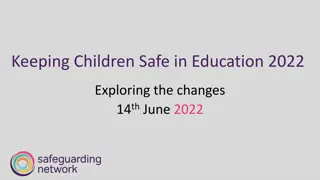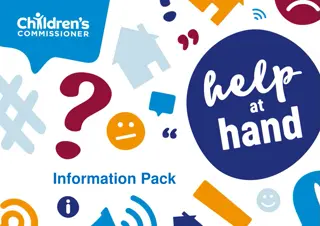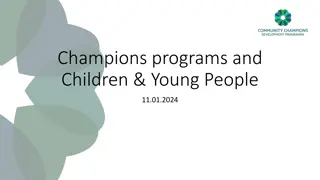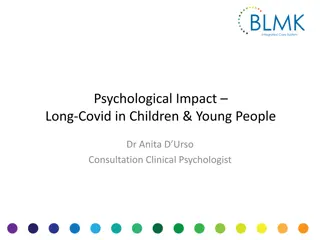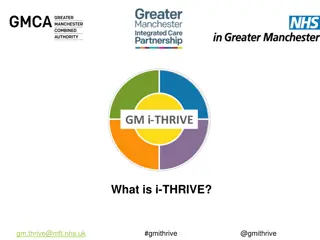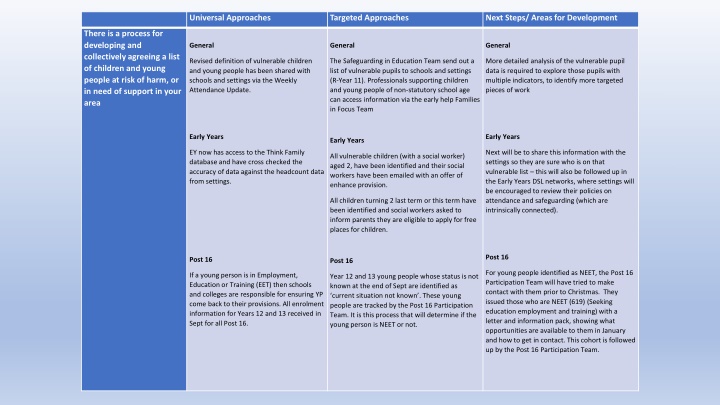
Approaches for Identifying and Supporting Vulnerable Children and Youth
Efficient processes are in place to identify and provide support to at-risk children and youth in various educational settings. Strategies include sharing revised definitions, cross-checking data, targeting specific interventions, and ensuring engagement post-holidays. Collaboration among multi-agency partners and education professionals plays a key role in monitoring attendance and identifying potential risks, especially during the COVID-19 pandemic.
Download Presentation

Please find below an Image/Link to download the presentation.
The content on the website is provided AS IS for your information and personal use only. It may not be sold, licensed, or shared on other websites without obtaining consent from the author. If you encounter any issues during the download, it is possible that the publisher has removed the file from their server.
You are allowed to download the files provided on this website for personal or commercial use, subject to the condition that they are used lawfully. All files are the property of their respective owners.
The content on the website is provided AS IS for your information and personal use only. It may not be sold, licensed, or shared on other websites without obtaining consent from the author.
E N D
Presentation Transcript
Universal Approaches Targeted Approaches Next Steps/ Areas for Development There is a process for developing and collectively agreeing a list of children and young people at risk of harm, or in need of support in your area General General General Revised definition of vulnerable children and young people has been shared with schools and settings via the Weekly Attendance Update. The Safeguarding in Education Team send out a list of vulnerable pupils to schools and settings (R-Year 11). Professionals supporting children and young people of non-statutory school age can access information via the early help Families in Focus Team More detailed analysis of the vulnerable pupil data is required to explore those pupils with multiple indicators, to identify more targeted pieces of work Early Years Early Years Early Years EY now has access to the Think Family database and have cross checked the accuracy of data against the headcount data from settings. Next will be to share this information with the settings so they are sure who is on that vulnerable list this will also be followed up in the Early Years DSL networks, where settings will be encouraged to review their policies on attendance and safeguarding (which are intrinsically connected). All vulnerable children (with a social worker) aged 2, have been identified and their social workers have been emailed with an offer of enhance provision. All children turning 2 last term or this term have been identified and social workers asked to inform parents they are eligible to apply for free places for children. Post 16 Post 16 Post 16 For young people identified as NEET, the Post 16 Participation Team will have tried to make contact with them prior to Christmas. They issued those who are NEET (619) (Seeking education employment and training) with a letter and information pack, showing what opportunities are available to them in January and how to get in contact. This cohort is followed up by the Post 16 Participation Team. If a young person is in Employment, Education or Training (EET) then schools and colleges are responsible for ensuring YP come back to their provisions. All enrolment information for Years 12 and 13 received in Sept for all Post 16. Year 12 and 13 young people whose status is not known at the end of Sept are identified as current situation not known . These young people are tracked by the Post 16 Participation Team. It is this process that will determine if the young person is NEET or not.
Universal Approaches Targeted Approaches Next Steps/ Areas for Development General COVID-19 Multi-agency Partners are regularly establishing whether these children are attending nurseries, schools, and colleges and assure yourselves that these children have reengaged in education following the Christmas holiday. All schools and settings have a duty to follow up on the attendance of all children and young people for whom they have responsibility. This is supported by the local authority through the Attendance Toolkit, Weekly Attendance Drop-ins, the EWS duty line, school attendance network meetings and CPD opportunities, some of which are provided FOC Weekly meetings with public health have been set up to specifically analyse school attendance data and the coding associated with the COVID-19 pandemic. This helps to identify any schools that could be disproportionally impacted by a localised outbreak. A reminder will be resent to the multi- agency partners regarding the reporting channels if they have concerns regarding attendance. This includes professionals who wish to report concerns if a pupil is on roll at a school or not. General Individual cases continue to be supported through the Weekly Attendance Drop-in online sessions and the Education Welfare Service duty help-line. The Local Authority can collect attendance data from the majority of schools and settings for children of compulsory school age via an online link. Summary attendance data is published for different phases in the Weekly Attendance Update
Universal Approaches Targeted Approaches Next Steps/ Areas for Development Schools and Settings General Multi- Agency Working There is a process for ensuring that partners and agencies have eyes on these children, particularly when absent from school this could include conducting visits to check on their wellbeing and safety. Guidance has been provided to all schools and settings regarding reasonable enquiries to ensure contact is made for any pupils where there is a concern about pupil absence. In cases where schools are unable to locate a pupil and the level of vulnerability identified is significant, welfare checks can be requested from the Police. Further promotion of the support available for the multi-agency working of colleagues outside of schools and settings is required in relation to attendance and follow up visits. The reporting of issues includes: Children Missing Education (for CYP not on a school roll), Elective Home Education (pupils whose parents/carers have taken on full responsibility for their child s education), Pupil Tracking (where pupils are on a school roll whose location cannot be confirmed) and Temporary Education Arrangements (TEAs) which include reduced timetables. This understanding to be supported by a CPD offer made available to relevant teams. Confirmation of the relevant process is supported through the development of an Attendance Model Policy, the Attendance Toolkit, CPD opportunities and School Attendance Network Meetings. In cases where pupils cannot be located and remain on roll a Pupil Tracking request should be made to the Education Welfare Team for further investigation and resolution. Individual cases continue to be supported through the Weekly Attendance Drop-in online sessions and the Education Welfare Service duty help-line.
Universal Approaches Targeted Approaches Next Steps/ Areas for Development Communication Specialist Meetings and Networks Locality Attendance Meetings Information sharing processes are adequate and effective between partners and agencies. Effective information sharing is supported by a clear communication plan which details the different approaches to support understanding of attendance related activities, these include: To support information sharing between partners and agencies there are a number of networks and meetings that take place: Development of Locality Attendance Meetings are being piloted in the south of the city to support practitioners in the development of attendance practice. School Attendance Network Meetings for schools and settings to support attendance related work with other agencies Designated Safeguarding Leads Networks which supports the development of safeguarding practice within the city including the link with attendance Attendance and Belonging Task Group which is a multi-disciplinary meeting within the local authority to focus on attendance related issues Task and Finish Groups to draw upon the expertise of partners and agencies regarding specific issues that can prevent CYP accessing education provision The Multi Agency Covid Meetings to work with partner organisations to support the city wide approach to the pandemic Weekly Attendance Updates Weekly Attendance Drop-ins Briefing notes and quick guides Chase up of daily forms Attendance toolkit Weekly follow up with schools and settings to ensure completion of the daily educational setting status form which provides COVID related information to the DFE, public health and the Regional Schools Commissioner.
Universal Approaches Targeted Approaches Next Steps/ Areas for Development Virtual School Strategic Plan Government Funding Partners are working with Virtual School Heads to support the attendance of looked after children and the extended group of children with a social worker that they support. Specialist Training has been provided to the Virtual School Team on attendance related matters. A draft strategic plan has been developed to promote the education of children with a social worker. The key themes are: Funding of the expansion of the role of the virtual school is yet to be confirmed by government beyond March 2022. The Virtual School support the attendance of CiC through participation in the Attendance Working Group and the Attendance and Belonging Task Group and a number of key attendance related Task and Finish Groups. Much of the work associated with the expansion of the role is linked to the BCC Belonging Strategy and therefore implementation of the work to support the key themes will continue. Partnerships Identifying needs and overcoming barriers to learning Attendance and promoting engagement Advice support and guidance Universal Approaches Targeted Approaches Next Steps/ Areas for Development Multi Agencies (MA) Covid Meetings Mapping of meetings involving supporting children and young people Expansion of CPD and training opportunities Partner agencies and a breadth of professionals, including health visitors, GPs and midwives are utilised to identify children, make appropriate referrals, and provide suitable support. These meetings have been held routinely throughout the pandemic involving a range of partner agencies and professionals. These meetings have provided an opportunity to inform colleagues about attendance related issues and pathways of support. To ensure there is a better understanding of the teams involved in supporting children and young people, a mapping exercise has been conducted to identify the meetings where named CYP and their families are discussed. This will help understand the interconnectivity of support and the development of a consistency of practice through CPD and training to ensure suitable referrals are being made. To ensure that appropriate referrals continue to be made it is important that as the workforce changes CPD and training opportunities continue to be available through the Keeping Bristol Safe Partnership and individual teams.
Universal Approaches Targeted Approaches Next Steps/ Areas for Development General Education Welfare Team Development of Family Hubs Partners are using their own communication channels and relationships with local communities to signpost to support and routes to report concerns. The Weekly Attendance Update provides an opportunity to share support routes for CYP regarding attendance concerns. The Education Welfare Team provides colleagues with advice and support as well as working with families and CYP, providing the opportunity to signpost access to support services as well as identify routes to report concerns. The development of Family Hubs continues within the LA. The LA were successful in two bids that were submitted to the Department of Education. We are now working with them as part of the Growing Up Well project and have been selected as one of five local authorities to take part in an evaluation to help support national policy making, where we will be looking to learn from other Local Authorities who are further ahead in their Family Hub journey. Team Around the School Meetings Schools are routinely provided with access to a social worker via the offer of a Team Around the School Meeting which provides the opportunity to discuss cases in detail before a referral is made via First Response. Families in Focus (FIF) FIF continues to provide advice and support and the links with local communities are supported through the work of the Partnership Managers. Safeguarding in Education Team The Safeguarding in Education Team (SET) provides advice to schools and settings and supports the development of policy and practice regarding safeguarding. The Designated Safeguarding Leads Network Meetings are held routinely to support partners with information sharing and the signposting of resources and support. The SET also offers CPD opportunities to schools, settings and teams within the LA regarding safeguarding duties including routes to report concerns.
Universal Approaches Targeted Approaches Next Steps/ Areas for Development This will need to be checked with multi-agency partners via the MA Covid Meeting This will need to be checked with multi-agency partners via the MA Covid Meeting This will need to be checked with multi- agency partners via the MA Covid Meeting In addition, we would ask safeguarding partners to have processes that are adequate for identifying pregnant women, babies, and young people who may be at risk of harm should any additional COVID-19 restrictions come into force.

